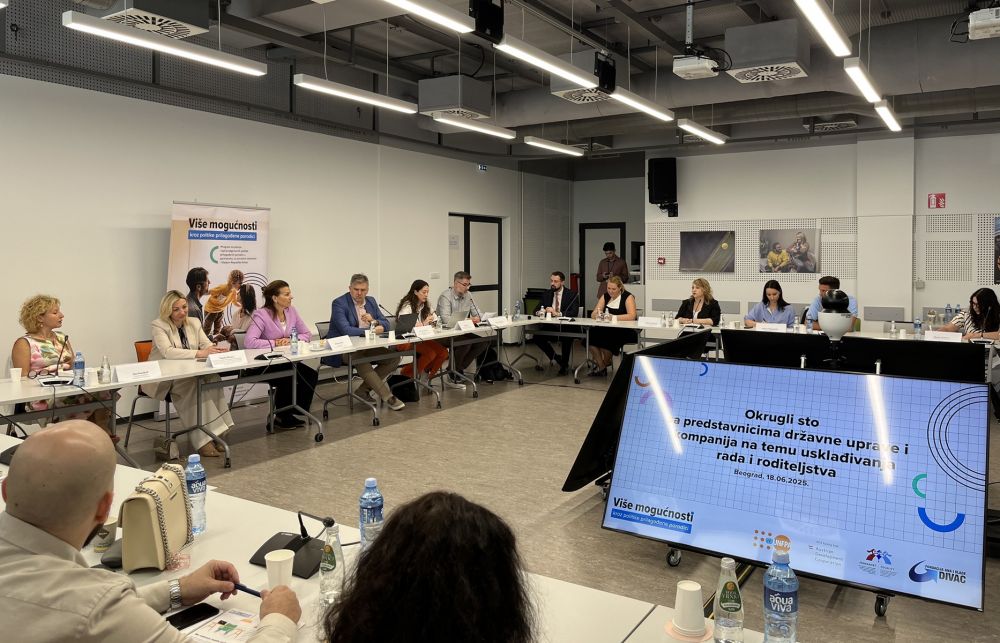Collaboration between public institutions, the private sector, and civil society is essential for fostering cooperation and dialogue on advancing family-friendly policies. This was the key conclusion of today’s roundtable, which brought together representatives from all three sectors. The event was held as part of the regional project “Family Friendly Policies for the Private Sector in the Western Balkans - Phase 2”, carried out by the United Nations Population Fund (UNFPA) in Serbia in collaboration with the Government of the Republic of Serbia and private sector, with active support from the Ana and Vlade Divac Foundation and financial support from the Austrian Development Agency.
"Challenges stemming from demographic changes, labor market insecurity, inflexible working conditions and altered family dynamics significantly impact parenthood. Therefore, concrete forms of support for parenting in the workplace, such as paternity leave, flexible working hours, affordable childcare services, and various other measures that contribute to a healthier balance between professional and family life, are crucial. Such initiatives not only empower employees but directly contribute to strengthening demographic resilience and benefit society as a whole," stated Borka Jeremić, Head of Office, United Nations Population Fund (UNFPA) in Serbia.
"The government's commitment to this topic is reflected in the policies we implement, but also in the concrete budgets we allocate for projects supporting parenthood, empowering women, and improving working conditions. It's time for employees to stop choosing between career and family. That is the responsibility of all of us—both the state and employers. Companies today must compete with each other not only in terms of profit, but also in who will create better conditions for their employees. In a labor market where a shortage of workforce is increasingly felt, companies that offer greater flexibility, understanding for parental roles, and gender equality will have an advantage. This is not just social responsibility; it is a smart business strategy,"," stated Tatjana Macura, Minister without portfolio in charge of gender equality, prevention of violence against women and economic and political empowerment of women.
The “Expanding Choices” project was launched at the regional level to support governments and companies in implementing policies that help employees reconcile professional and family responsibilities. The aim is to promote greater participation of women in the labor market and a more equitable distribution of unpaid work. In the first phase of the project, UNFPA developed the “Family-Friendly Workplace” model, which embraces a broader concept of family to include diverse forms of caregiving, support, and togetherness. The model supports all employees—regardless of their parental status—in achieving a balance between career and family responsibilities, creating an inclusive and supportive work environment.
So far, the results have shown that such policies are a powerful tool for transforming entrenched gender norms and promoting a fairer division of unpaid labor at home, thereby enabling both women and men to fulfill their ambitions with simultaneous benefits to the companies.
“The Ana and Vlade Divac Foundation is proud of the excellent collaboration with companies and business associations. Through this project, we’ve held a series of info sessions, workshops, and mentoring activities. We’re also proud of the tangible results these companies have achieved, with our support, in implementing the Family-Friendly Workplace model,” said Ana Koeshall, Director of the Ana and Vlade Divac Foundation.
One of the project activities includes direct engagement with ten champion companies that expressed interest to participate in the project. With mentoring support, they have already implemented initiatives to help their employees balance work and private life. While some companies introduced “Family Day” events as a platform for employees’ families to connect with the company and each other, others introduced measures to support mothers returning to work, paid leave without the need for paperwork and without salary deductions, time off to care for children or older family members, as well as days off to care for pets and other benefits.
“At our first Family Day, which we recently launched, our company hosted about 120 people—employees, their children, partners, relatives, siblings, and four-legged friends. In addition to socializing and fun, they had a chance to see what our work environment and workday look like. The atmosphere was excellent, and many employees expressed appreciation for this new initiative,” said Emilija Stojanović, HR and Administrative Manager at TGRS d.o.o.
By investing in family-friendly initiatives and supporting employees’ efforts to maintain a work-life balance, companies can enhance their brand, increase profitability, improve talent attraction and retention, and demonstrate social responsibility. Research shows that younger generations (Millennials and Generation Z) prefer employers whose values support work-life balance, career advancement, and personal development. The “Family-Friendly Workplace” model aims precisely to establish this balance, contributing to higher employee productivity and better outcomes for companies.
The development of a more supportive work environment through this project has been further strengthened thanks to the institutional support of the Serbian Chamber of Commerce, the Union of Employers of Vojvodina, and the UN Global Compact Network, which actively promote this model within their business communities.
